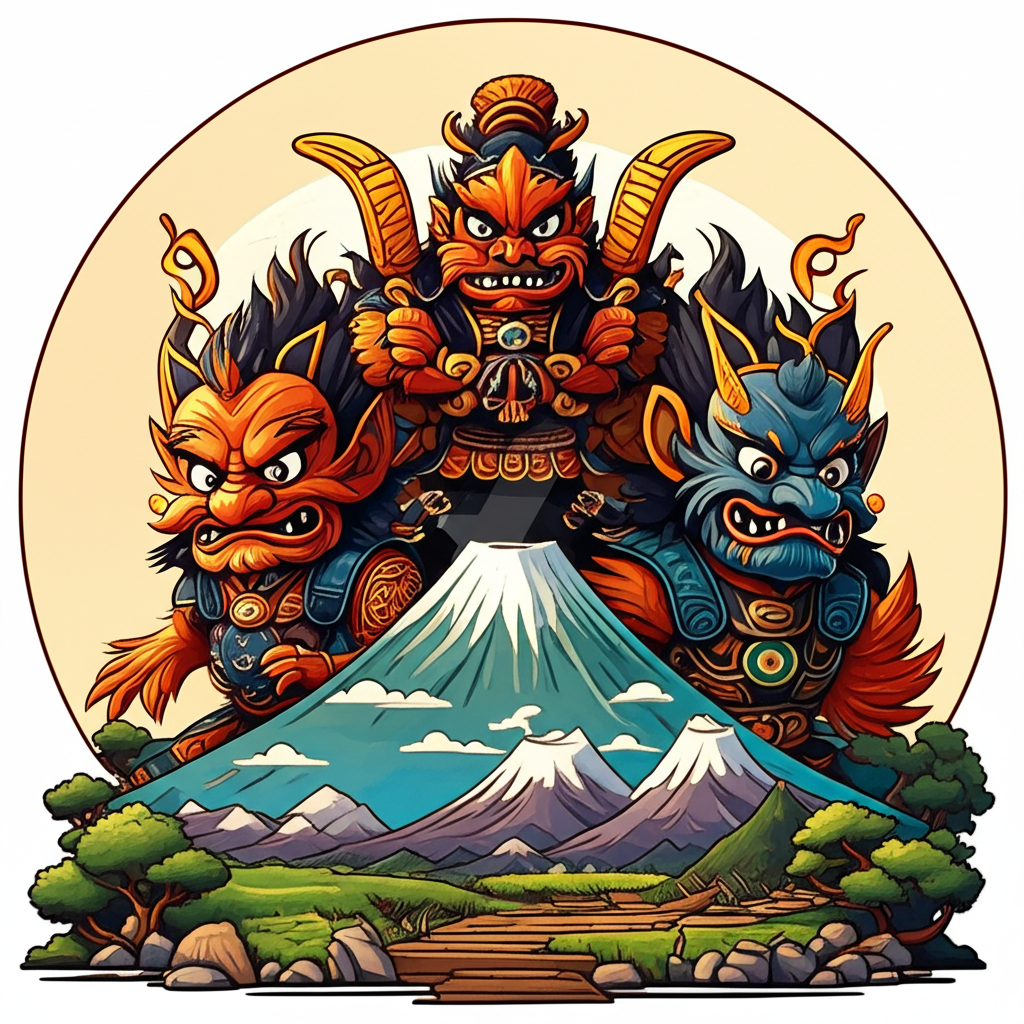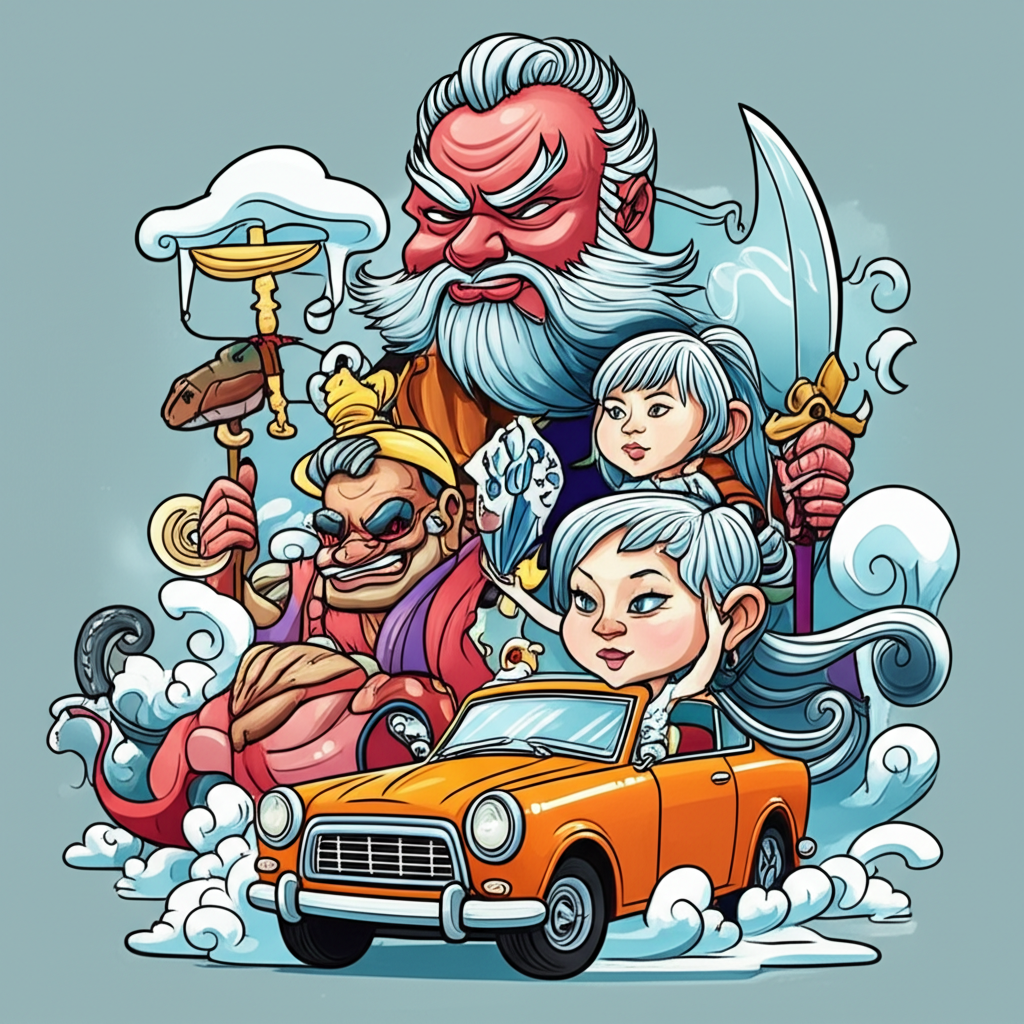
From the mists of ancient Japan, a land steeped in folklore and reverence for the natural world, comes the legend of the Tengu, enigmatic beings deeply intertwined with the spirit of the mountains. This is not a tale of divine power or a call to belief, but rather a glimpse into the rich tapestry of stories woven by the people of Japan long ago, a reflection of their fears, aspirations, and understanding of the world around them.
Origins and Cultural Background:
The myth of the Tengu took root and flourished during the Heian (794-1185 AD) and Kamakura (1185-1333 AD) periods of Japanese history. This was an era marked by the rise of powerful warrior clans, the influence of Buddhism and Shintoism, and a deep connection to the land. Life was intimately tied to the cycles of nature, and the mountains, especially sacred peaks like Mount Fuji, were viewed as places of immense spiritual power.
The people of this time lived in a world where the line between the natural and supernatural was blurred. Animism, the belief that spirits inhabit all things, was prevalent. Natural phenomena like storms, earthquakes, and volcanic eruptions were often attributed to the actions of deities and spirits. In this context, the Tengu emerged as powerful figures embodying the wild, untamed aspects of the mountains, both feared and respected. They represented the dangers and unpredictability of the wilderness, as well as the potential for enlightenment and spiritual growth that could be found in solitude and communion with nature.
Character / Creature Description:
The Tengu are typically depicted as humanoid creatures with avian features. Their most striking characteristic is their long nose, which in some depictions resembles a beak. They are often portrayed with red faces, large, piercing eyes, and powerful wings. They wear the attire of yamabushi, mountain ascetics known for their rigorous training and spiritual practices. This attire usually includes a small black cap (tokin), a robe, and geta (wooden sandals).
The appearance of the Tengu is symbolic. Their bird-like features connect them to the sky and the freedom of flight, representing a transcendence of earthly limitations. Their long nose, often exaggerated, can be interpreted as a symbol of arrogance or pride, qualities that the Tengu were often associated with. However, it can also be seen as a symbol of discernment, their ability to perceive things that are hidden from ordinary humans. Their association with yamabushi attire links them to spiritual discipline and the pursuit of enlightenment, but also highlights the potential for power and corruption that can come with such knowledge. They were not simply evil monsters, but complex figures embodying both virtuous and flawed aspects of humanity.
Main Story / Narrative Retelling:
High atop the slopes of Mount Fuji, where the air thinned and the wind howled like a restless spirit, lived a Tengu named Karasu-Tengu, or "Crow Tengu." His red face was weathered by centuries of wind and snow, and his piercing eyes had witnessed the rise and fall of countless seasons. Karasu-Tengu was one of the guardians of the mountain, a protector of its sacred groves and a judge of those who dared to trespass upon its domain.
One day, a young samurai named Kenji ventured into the mountain’s heart. Driven by ambition and a thirst for glory, he sought to conquer the mountain’s treacherous peaks, believing that by doing so, he would prove his worth to his clan. He ignored the warnings of the villagers, dismissing their tales of the Tengu as mere superstition.
As Kenji climbed higher, the air grew colder and the path more treacherous. He pressed on, his determination fueled by pride. Suddenly, a figure descended from the sky, its wings casting a long shadow across the snow. It was Karasu-Tengu, his eyes burning with a fierce intensity.
"You dare to trespass upon the sacred mountain with such arrogance in your heart?" Karasu-Tengu boomed, his voice echoing through the peaks. "You seek to conquer what is not yours to conquer. The mountain belongs to the spirits, to the wind and the snow. It is a place of reverence, not conquest."
Kenji, though startled, drew his sword. "I fear no spirit," he declared. "I will reach the summit, and I will claim victory!"
Karasu-Tengu sighed, a sound like the rustling of ancient leaves. "Very well," he said. "But know this: the mountain will test you. It will reveal the true nature of your heart."
And so, Karasu-Tengu led Kenji on a perilous journey through the mountain’s hidden paths. He tested the samurai’s strength, his courage, and his compassion. He showed him the beauty of the mountain’s flora and fauna, the fragility of its ecosystem, and the interconnectedness of all things.
As Kenji faced these challenges, his arrogance began to fade. He realized that true strength lay not in conquering, but in understanding and respecting the natural world. He learned humility and empathy, and his heart began to soften.
Finally, they reached the summit. As Kenji gazed upon the breathtaking view, he no longer felt the need to conquer. He felt a sense of peace and gratitude. He had not conquered the mountain, but the mountain had conquered him, transforming him into a better man.
Karasu-Tengu smiled, a rare and gentle expression. "You have learned the true meaning of the mountain," he said. "You are no longer a threat. You are now a guardian."
Symbolism and Meaning:
The story of the Tengu, particularly as guardians of mountains like Mount Fuji, represents several key themes important to ancient Japanese society. It embodies the respect for nature, the dangers of arrogance, and the transformative power of humility. The Tengu served as a reminder that humanity is not above nature but rather a part of it, and that true strength lies in understanding and respecting the delicate balance of the natural world. They also symbolized the potential for enlightenment and spiritual growth that could be found in solitude and communion with nature, but also the dangers of unchecked ambition and the corruption of power. The Tengu were a warning to those who sought to exploit or desecrate the sacred places.
Modern Perspective:
Today, the Tengu continues to be a popular figure in Japanese culture, appearing in literature, anime, manga, video games, and film. They are often portrayed as powerful warriors, skilled martial artists, or wise mentors. Their image has been adapted and reinterpreted in various ways, reflecting the changing values and concerns of modern society. Cultural studies explore the figure of the Tengu as a symbol of Japanese identity, its relationship with nature, and its historical context. The enduring popularity of the Tengu demonstrates the power of myth and folklore to capture the imagination and transmit cultural values across generations.
Conclusion:
The legend of the Tengu is a fascinating example of the rich and imaginative storytelling tradition of ancient Japan. It is a cultural artifact, a window into the beliefs and values of a bygone era. It is not a matter of religious belief, but rather a story that speaks to universal themes of respect for nature, the dangers of pride, and the importance of humility.
As Muslims, we recognize that only Allah is the true Creator and Sustainer of the universe. The stories of the Tengu, like all myths and legends, are the creations of human imagination, reflecting the cultural and historical context in which they were born. We appreciate them as part of our shared human heritage, a testament to the power of storytelling and the enduring human fascination with the mysteries of the world around us. Let us reflect upon these tales with respect for the traditions of others, understanding them as works of imagination and cultural expression, while remaining steadfast in our faith and conviction.




